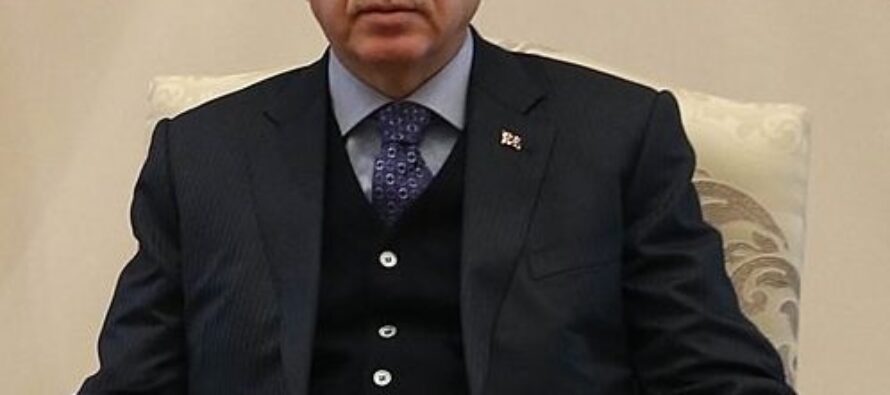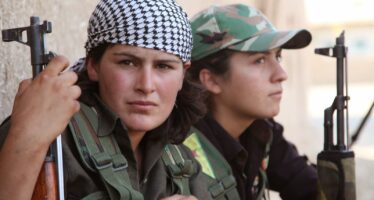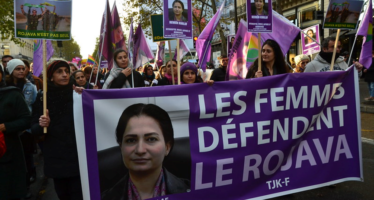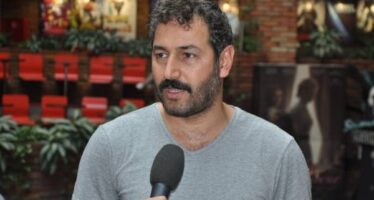TURKEY: NEW YEAR? NEW STRUGGLE FOR HUMAN RIGHTS

![]()
“Turkey is neither America nor Abu Ghraib… Let us recall the resistances of Diyarbakir, Mamak, Metris, Umraniye, Ulucanlar prisons to those who remind us of Guantanamo…” Selahattin Demirtaş, Co-Chair, Peoples’ Democratic Party [HDP], Edirne Prison, December 24, 2017
Following Turkish President (and Chairman of the ruling Justice and Development Party) Recep Tayyip Erdoğan’s threats last summer to impose prison uniforms on Turkish political prisoners (following the appearance in court of a post-coup soldier wearing a tee-shirt with the word “HERO” on it) the year has ended with the passing of Emergency Decree 696, bypassing, as usual, the scrutiny of parliament due to the extraordinary powers resulting from the now-extended State of Emergency (that enables the President to sign executive orders without consulting Parliament). As part of its 137 articles there is legislation for the special jumpsuit uniforms of grey and brown (to include both those charged with ‘terrorist’ offenses and coup plotters) which has caused intense concern, both in Turkey and abroad, for its additional threat to the deteriorating human rights situation in the country.
President Erdoğan had said, mid-July 2017, during an Istanbul rally to mark the first anniversary of the July 15, 2016 coup attempt, that people detained over coup charges should wear a single outfit, like in Guantanamo (the US prison in Guantanamo Bay in Cuba):
“When they appear in court, let’s make them appear in one-type uniform like in Guantanamo…”
Likewise, later in the summer the Hürriyet Daily News had reported him speaking at the opening of a new stadium on August 5 in the eastern province of Malatya:
“Now we are introducing the single-type attire. It will be dark almond-colored. There will be jumpsuits and there will be jackets and trousers,” Erdoğan said.
He added that jumpsuits will be worn by “coup plotters” and jackets and trousers will be worn by “terrorists”… “No more coming to court wearing whatever they want,” the President concluded.
“Turkish President Recep Tayyip Erdogan, has defended the single-type uniform policy, citing the decision by the U.S. to implement similar practices in its own prisons, including Guantanamo. “This is not exclusive to Turkey,” Erdoğan said, “The US practices it [as well]”. Claiming that this practice was a response to the demands of victims’ families, Erdoğan also sought to emphasise the precedent set by the United States: “I can further say: They even imposed a lifestyle where prisoners wear identical uniforms in Guantanamo.” (theregion.org)
While Erdoğan argues he is targeting suspected members of the Gülen movement (FETÖ, or Fethullahçı Terör Örgütü, in Turkey; the accused soldier who wore the offending tee-shirt in court assumed to be one), other suspects on trial over “terror” charges, however, as has been the case since he survived the coup, are in the firing line as well, including as is now becoming almost transparently apparent, any opposition or critical voices in President Erdoğan’s Turkey.
“I have spoken with our prime minister and said when they appear in court, they should wear one type of outfit, like in Guantanamo.”
This brings to mind the situation in Turkey in the 1980s following the military coup d’état (1908-1983) where prison uniforms were also introduced and resisted throughout the whole decade resulting in a prolonged prison struggle including the use of the hunger strike, reminiscent of the situation in the ‘cages’ of ‘Long Kesh’ and Armagh Women’s Prison in Ireland in the previous decade. Numerous hunger striking political prisoners died in Turkish prisons in those years.
“In Diyarbakır Prison the PKK member Mazlum Doğan burned himself to death on 21 March 1982 in protest at the treatment in prison. Ferhat Kurtay, Necmi Önen, Mahmut Zengin and Eşref Anyık followed his example on 17 May 1982. On 14 July 1982 the PKK members Kemal Pir, M. Hayri Durmuş, Ali Çiçek and Akif Yilmaz started a hunger strike in Diyarbakir Prison. Kemal Pir died on 7 September 1982, M. Hayri Durmuş on 12 September 1982, Akif Yilmaz on 15 September 1982 and Ali Çiçek on 17 September 1982. On 13 April 1984 a 75-day hunger-strike started in Istanbul. As a result, four prisoners – Abdullah Meral, Haydar Başbağ, Fatih Ökütülmüş and Hasan Telci – died. Many more prisoners died as a result of hunger strikes and fast-to-death actions.” (Wikipedia) Efforts to implement the practice were finally discontinued in 1989 following the prisoners’ resistance and a challenge in the Turkish courts.
Between July and December 2017 a number of reports filtered through the media of the Guantanamo-type-jumpsuits being commissioned to be sewn in at least 2 of the now-well-populated Turkish prison complexes as well as numerous prisoners issuing statements that they would resist the use of these uniforms.
By August of 2017, opposition had began to coalesce:
Imprisoned Turkish Journalist, Mahir Kanaat was quoted a speaking with the Republican People’s Party (CHP) deputy Utku Çakiözer during a visit to Istanbul’s Silivri Prison during August 27:
“Çakiözer said Kanaat referred to measures taken after Turkey’s military coup in 1980. ‘Just like those being tried in cases after the [1980 coup] protested against the single-uniforms by undressing, we are determined to do the same,’ he said. Kanaat, who was detained by police on Dec. 25, 2016, is accused of having connections to the hacker group RedHack. He is charged with “being a member of an armed terrorist organization” and denies all accusations.”
“Çakirözer also condemned the possible standardized outfit measure, saying it would overshadow the right to a fair trial.
‘Those governing our country should think very well of the trauma and negative psychology that such a measure would cause. All the journalists who I have met, without exception, are disturbed about this issue. If such a ruling comes out, they are thinking of not attending the trials and not even defending themselves. The decision to implement a single-type uniform would overshow the holiness of the principles of a right to defense and the right to a fair trial,” he said.
“Who would win from the image of a journalist undressing in front of the court? [Such an image] would cause all of us in Turkey to lose. It would create a bad perception for Turkey in front of the world,” Çakırözer added.” (Hürriyet Daily News)
Now with December just gone, it appears Decree 696 has changed the playing field.
A significant number of bodies both inside Turkey and farther afield have spoken out against this move.
Selahattin Demirtaş:
“We prefer to be wrapped in burial shrouds instead of kowtowing to fascism and wearing prison uniforms…
We will not surrender to fascism and we will die if necessary but we will not accept the single-type uniform policy…
We will never accept the government’s attempts to convert into a fascist regime through an uninterrupted State of Emergency and a Decree-law system.”
Democratic Regions Party (Demokratik Bölgeler Partisi – DBP) Co-chair Sebahat Tuncel also issued a message about the Statutory Decree, from the Kandira Type F Prison No.1 where she is under arrest. Pointing out that: “Turkey is being dragged off a cliff… The most recent Statutory Decree gives state protection to crimes against humanity, torture, labour exploitation and polarization. The uniform practice is an attack on human dignity, rights and freedoms. We will never accept this indignity imposed upon us. We will not only tear out these uniforms but we will also increase the resistance against this mindset.”
Finally on January 2, Firat News (ANF), the Kurdish news agency based in Amsterdam, released a statement from the PKK (Kurdistan Workers’ Party) and PAJK (Free Women’s Party of Kurdistan) prisoners:
“The Erdoğan government enacting the uniform in prisons has taken fascism to an unlimited level. On one hand they criticize the US and their system, and on the other they reference Guantanamo. Then they claim the uniform is a demand by the oppressed people. Apparently they want to legitimize themselves with a paper policy. But the Erdoğan government should know this: We as the PKK and PAJK prisoners will never wear the uniform. We will tear it up if you force it on us. Our stance on this issue is very clear. The main purpose of the uniform is to rob individuals of their identity and will. The practical implementation of the nation state homogeny and its denial and annihilation policy are found in Erdoğan exposing himself with the rabia sign*. Now they add the uniform to this practice and fool themselves acting with the idea that they are innocent and the people in prison and in society are the ones who are guilty.
We are people who defend human rights and the freedom of thought for a free and just life. We are people who fight for social freedom and the truth and use legitimate self defense for our goals and ideals. The laws they call crimes and punishments stem directly from keeping the nation state mentality intact and unharmed. For that, according to a universal understanding of the law, not every prisoner is a criminal. But the Erdoğan government sees anybody who doesn’t bow down to them as criminal.
The uniform practice will create a people on the brink of modern day slavery in the prisons. They are trying to create a personality that is not one’s own, that has been transformed, or rather a personality without personality. They are creating a legal cover for this and attributing it to society. Erdoğan’s persona can only exist against humanity, society and its nature and morality, and it wants others to live the same. We the PKK and PAJK prisoners will never let this happen. We will represent the PKK and PAJK identity under any and all circumstances. If there are negative attacks on our human dignity and our will, nobody can even imagine what we will do. Your reference is Guantanamo, and ours is the July 14 Prison Resistance of 1982. The spirit, perception and mentality of Erdoğan’s persona takes monism as a base, while we base ourselves on Mazlum Doğan’s motto, ‘Submission leads to treason, pacifism leads to defeat and resistance leads to victory’, we will continue to do so and we will never give up resisting in the line of victory.”
Here in Ireland we witnessed both ‘Dirty Protests’ and ‘Blanket Protests’ by republican and republican socialist prisoners in the British controlled Maze Prison (“Long Kesh”) and in Armagh Women’s Prison in Northern Ireland. In July 1972 as the war in the North grew in intensity, Special Category status was introduced following a hunger strike by 40 IRA political prisoners. Status meant that they would not be obliged to wear prison uniforms nor engage in prison work as a recognition of their political status, if not their being ‘prisoners-of-war’. However by 1976 the British Government ruled that this special status be withdrawn, resulting in the prisoners refusing to wear the uniforms issued and remaining in their cells naked or wearing only prison issue blankets…On September 4 1976 Kieran Nugent began the ‘Blanket Protest’, in which IRA and INLA prisoners refused to wear prison uniforms and either went naked or fashioned garments from prison blankets. This struggle was to end with the Hunger Strikes of 1981 where 10 men would lose their lives by 10 October 1981. By 12 October Northern Ireland Secretary of State James Prior had conceded that the prisoners would be allowed to wear their own clothes.
“Nugent only wore a prison uniform once, when his mother visited the prison. He told her: “You will not be seeing me for three years because to have a visit I have to wear uniform. If they want me to wear a uniform they’ll have to nail it to my back.” (Kieran Nugent in Bishop & Mallie’s 1987 book, ‘The Provisional IRA’).
President Erdoğan might do well to take note.
Other critics of the new policy also include the European Union as well as others concerned that the wearing of the prison garment will violate the presumption of innocence as well as the right to a fair trial and due process.
“A European Union spokesperson said in early September that reports of a government plan for suspects standing trial on coup charges in Turkey to wear identical uniforms were worrying. Underlining the significance of respect for the right to a fair trial and a commitment to a state of law, the EU spokesperson said: ‘The European Union has on many occasions stressed that any alleged wrongdoing or crime should be subject to due process and that the right of every individual to a fair trial needs to be respected, as well as the principle of the presumption of innocence.’” (Turkey Purge) The Council of Europe has also taken “the government decrees and the recent developments under review and…there are certain concerns on the issue…The body is monitoring whether the latest state of emergency decrees are compatible with the European Convention of Human Rights (ECHR)…”
“At this stage, there’s only an assessment on the new decree laws, because there are some issues. Secondly, depending on the assessment, it’s likely that we will be in touch with the Turkish authorities to ask for further information and clarification. Depending on that, thirdly, we may see need for further dialogue and suggestions with the Turkish authorities,” Council of Europe Director of Communications Daniel Holtgen.
Likewise former European Court of Human Rights (ECtHR) judge Rıza Türmen said in August 2017 that “obliging all suspects in ongoing trials concerning the failed coup to wear identical uniforms is against human rights and violates the right to a fair trial.” (Turkey Purge)
It appears now that Turkey is taking one more step deeper into the dark night of oppression, a disregard for democratic principles and for fundamental human rights as well another step on the road to the dehumanisation that appears to be fundamental to all regimes intent on denying the demands of both democracy and the will of all of its people.
“…not every prisoner is a criminal. But the Erdoğan government sees anybody who doesn’t bow down to them as criminal.” (PKK and PAJK political prisoners, Turkey)
Another year. Another struggle.
séamas carraher
IMAGE:
By U.S. Department of State from United States [Public domain], via Wikimedia Commons
https://commons.wikimedia.org/wiki/File%3AErdogan_2017.jpg
REFERENCES:
https://anfenglish.com/human-rights/we-will-resist-the-indignity-of-the-uniform-23909
https://www.rt.com/news/398804-turkey-coup-prison-uniform-gitmo/
http://www.kurdistan24.net/en/news/1c9f5161-8079-4a0b-b087-f4ef75d27ade
https://en.wikipedia.org/wiki/Torture_in_Turkey
*Rabia sign:
https://en.wikipedia.org/wiki/Rabia_sign
ANF Update, January 7th 2018:
https://anfenglish.com/human-rights/disciplinary-punishment-for-prisoners-resisting-uniform-24073
Video Footage:
Kurdish Members of Parliament in Turkey | DW Documentary
https://www.youtube.com/watch?v=4UEW5PIV_d4
Related Articles
Federal Democratic Union of Rojava/Northern Syria
![]()
Statement issued on 17th March 2016 by the Constituent Council for The Federal System in Rojava/Northern Syria
Outrage – and More Outrage …Lest we forget Hevrîn Khalaf
![]()
On 12 October 2019, Hevrîn Khalaf and her driver were killed by Turkish-backed Ahrar al-Sharqiya mercenaries near the M4 Motorway as part of the Turkish military invasion «Operation Spring Peace»
Aydemir: Cinema helps to build Kurds’ collective memory
![]()
Interview with Hasim Aydemir, director of the film “14 Tirmeh” (14 July). The film is somehow a ‘first’ in that opened the way to bring to cinema the resistance and more in general the 40-year long struggle of the Kurdish people




